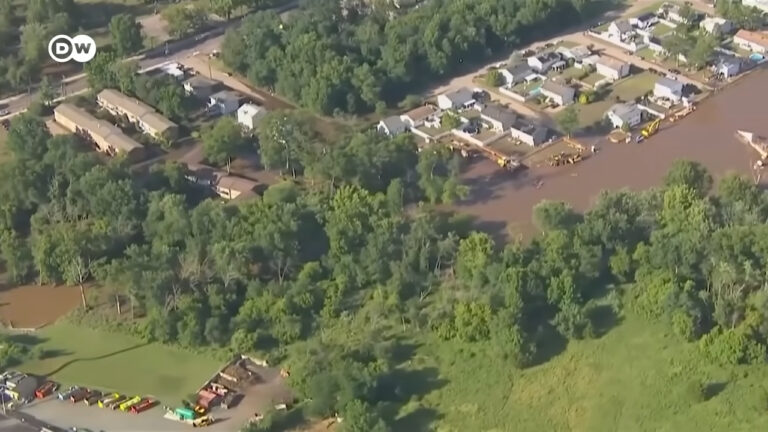Now to the United States where two people have died in New Jersey during flash floods as severe storms lashed New York City and other parts of the north northeast.
Travel has been disrupted across several states with officials urging people to remain cautious as cleanup efforts begin. In New Jersey, floods submerged cars and a cemetery.
Two people died as their vehicle was swept away. The state’s governor said climate change was to blame for the increasing frequency of extreme weather with some areas seeing flooding for the first time. New Jersey residents confirmed the unusual nature of the storms. We also had deaths on July 3rd. So this is like an unusual happening for this area um to have you know uh fatalities as a result of a a storm in New York City.
Passengers in a Manhattan subway car were stranded as the station became submerged. Service was back up and running by early Tuesday with New Yorkers typically unruffled by the previous night’s events. It looks to me like if it was flooded yesterday and it’s completely clear today and nobody was hurt, New York’s doing fine. I mean, it’s not the first time that it floods. Um, I’ve been working here for 11 years. So, whenever there’s like massive rain, we know that this station is not going to be working.
Despite the business as usual attitude in the Big Apple, there is growing fear of a new climate reality in the US with these storms following hot on the heels of the deadly Fourth of July flooding in Texas. Right, we’ve got Matthew Kapuchi. He’s a meteorologist and atmospheric scientists. It’s great to have you here to pick through this a little bit.
First of all, what do you know about the situation right now?
Is the heavy rain continuing to fall? Well, the good news, the rain has mainly shifted off to the south and east. It’s over the Virginia Tidewater right now, but yesterday up and down Interstate 95 in the eastern US. It was just an absolute deluge. Slowmoving downpours moving through at rush hour.
Lots of folks caught on the road as the heaviest rains fell. It was a really high-end situation. And in advance of this, there were flood watches in effect. Now, I just took a look at the numbers. One location in Union County, New Jersey, saw 16.7 cm in only about 3 4 hours time.
And the craziest part, 9.88 cm fell between 5 and 6 p.m., which is a roughly once every 100 to 200 year event. Now, of course, the atmosphere is getting more moist due to human induced climate change, making downpours like this all the more, you know, likely to occur.
But nonetheless, a very high-end meteorological setup leading to serious flash flooding and spots. Perhaps you can tell us a little bit more about what the reasons for this exceptionally heavy storm are. Where’s it all come from?
Great question. So, northern New Jersey and west of New York City was the intersection of two different weather boundaries. a slowmoving cold front sagging down from the south which was kicking up warmth and moisture but also something called a lead trough or a broad weak diffused strip of low pressure east of the Appalachian’s mountains and that weak low pressure fostered convergence or the gathering of air enough that we kicked air upwards and generated storms.
It was a super moist air mass but what happened was that you had a line of storms form and then several renegade cells ahead of it. So, first these areas saw individual storm cells that were backbuilding or kind of regenerating, pulling in more moisture from the south and continually feeding themselves, nourishing themselves and growing.
And then you had a line of storms come in and it all kind of merged over Union
County, New Jersey, leading to the very high rainfall rates on the order of 8 to 10 cm per hour at times in those heaviest downpours. National Weather Service, of course, issuing a high-end flash flood warning, saying it was quote, “a considerable episode,” meaning it was one of those higherend events that actually triggered wireless emergency alerts.
Everybody’s phones buzzed with those emergency alerts. It finally wound down yesterday evening, but there’s a chance of more storms later this week, and of course, more flooding, too.
Now, these storms have been deadly. The US government’s pretty much turned its back on all of its international climate change agreements and wound back policies aimed to curb global warming.
How do events like this play into the political discourse around climate change and the way in which we deal with them when events like this happen? That’s a really good question.
I think it’s important to remember that nothing really occurs in a vacuum, even in the world of weather. Now, weather, of course, has a lot of random events. Sometimes you get a really heavy downpour, sometimes you don’t. And in the thunder in the summertime, you get more of these thunderstorms. And thunderstorms will always produce heavy rains. But what’s important to know is that the background state of the atmosphere is becoming more moist. And as you add more moisture to the atmosphere, not only do you have more juice to work with in storms, but you have greater precipitation efficiency.
Meaning, if all the levels of the atmosphere are moist, more of that raindrop makes it down without evaporating, leading to higher rainfall rates. It’s like this self-reinforcing cycle.
You probably saw me scribbling down some notes moments ago. I was taking a look at some data.
You know, since 1998, we’ve seen a remarkable increase in atmospheric moisture during the month of July in Union County, New Jersey.
Uh we’re seeing about a 9.5% increase in moisture every 10 years during July, which goes to show you we’re really souping up the atmosphere, and these high-end rainfall events are made more common. In fact, across the northeastern US, we’re seeing like a 70 to 75% uptick in heavy rain and flash flood events during the summertime months.
And that’s something we do expect to see more of with climate change. So ultimately, you know, political leaders will either use weather events to or for, you know, whatever causes they want to. But it’s important to remember that weather does happen. Weather is random at times, but the background state of the climate is favoring more precipitation extremes.
Matthew Kapuchi, it’s really great to get your insights there.




